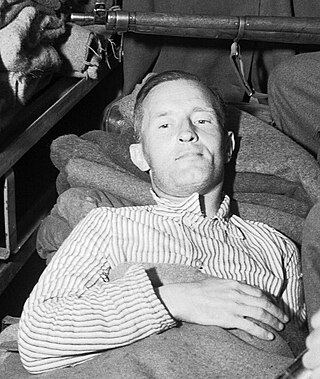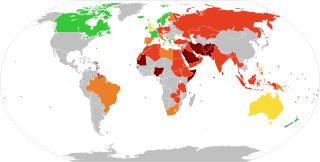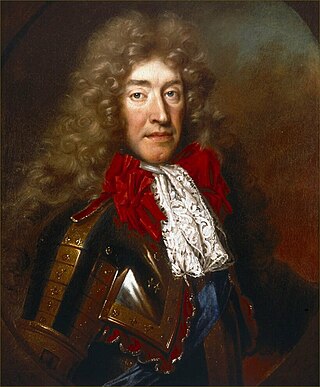
The Restoration of the Stuart monarchy in the kingdoms of England, Scotland and Ireland took place in 1660 when King Charles II returned from exile in continental Europe. The preceding period of the Protectorate and the civil wars came to be known as the Interregnum (1649–1660).
Blasphemy, as defined in some religions or religion-based laws, is an insult that shows contempt, disrespect or lack of reverence concerning a deity, an object considered sacred or something considered inviolable. Some religions regard blasphemy as a religious crime, especially the Abrahamic religions, including insulting the prophet Muhammad in Islam, speaking the "sacred name" in Judaism, and the "eternal sin" in Christianity.
The Test Acts were a series of penal laws originating in Restoration England, passed by the Parliament of England, that served as a religious test for public office and imposed various civil disabilities on Catholics and nonconformist Protestants.
In England, Scotland, Wales, and Ireland, and the British colonies, there has historically been a succession of Witchcraft Acts governing witchcraft and providing penalties for its practice, or—in later years—rather for pretending to practise it.

Under the law of the United Kingdom, high treason is the crime of disloyalty to the Crown. Offences constituting high treason include plotting the murder of the sovereign; committing adultery with the sovereign's consort, with the sovereign's eldest unmarried daughter, or with the wife of the heir to the throne; levying war against the sovereign and adhering to the sovereign's enemies, giving them aid or comfort; and attempting to undermine the lawfully established line of succession. Several other crimes have historically been categorised as high treason, including counterfeiting money and being a Catholic priest.
Laws prohibiting blasphemy and blasphemous libel in the United Kingdom date back to the mediaeval times as common law and in some special cases as enacted legislation. The common law offences of blasphemy and blasphemous libel were formally abolished in England and Wales in 2008 and Scotland in 2021. Equivalent laws remain in Northern Ireland.
Thomas Aikenhead was a Scottish student from Edinburgh, who was prosecuted and executed at the age of 20 on a charge of blasphemy under the Act against Blasphemy 1661 and Act against Blasphemy 1695. He was the last person in Great Britain to be executed for blasphemy. His execution occurred 85 years after the death of Edward Wightman (1612), the last person to be burned at the stake for heresy in England.

The Sedition Act 1661 was an Act of the Parliament of England, although it was extended to Scotland in 1708. Passed shortly after the Restoration of Charles II, it is no longer in force, but some of its provisions continue to survive today in the Treason Act 1695 and the Treason Felony Act 1848. One clause which was included in the Treason Act 1695 was later adapted for the United States Constitution.
Patriot Parliament is the name commonly used for the Irish Parliament session called by King James II during the Williamite War in Ireland which lasted from 1688 to 1691. The first since 1666, it held only one session, which lasted from 7 May 1689 to 20 July 1689.

A blasphemy law is a law prohibiting blasphemy, which is the act of insulting or showing contempt or lack of reverence to a deity, or sacred objects, or toward something considered sacred or inviolable. According to Pew Research Center, about a quarter of the world's countries and territories (26%) had anti-blasphemy laws or policies as of 2014.

The Act 53 Geo. 3. c. 160, sometimes called the Doctrine of the Trinity Act 1813, the Trinitarian Act 1812, the Unitarian Relief Act, the Trinity Act, the Unitarian Toleration Bill, or Mr William Smith's Bill, was an Act of the Parliament of the United Kingdom which amended its blasphemy laws and granted toleration for Unitarian worship.
In Ireland, "publication or utterance of blasphemous matter", defamatory of any religion, was a criminal offence until 17 January 2020. It was a requirement of the 1937 Constitution until removed after a 2018 referendum. The common law offence of blasphemous libel, applicable only to Christianity and last prosecuted in 1855, was believed to fulfil the constitutional requirement until a 1999 ruling that it was incompatible with the constitution's guarantee of religious equality. The Defamation Act 2009 included a provision intended to fill the lacuna while being "virtually impossible" to enforce, and no prosecution was made under it. The 2009 statute increased controversy, with proponents of freedom of speech and freedom of religion arguing for amending the constitution. After the 2018 constitutional amendment, a separate bill to repeal the 2009 provision and residual references to blasphemy was enacted in 2019 by the Oireachtas (parliament) and came into force in 2020. The Prohibition of Incitement to Hatred Act 1989, which includes religion among the characteristics protected from incitement to hatred, remains in force.

The Restoration was the return of the monarchy to Scotland in 1660 after the period of the Commonwealth, and the subsequent three decades of Scottish history until the Revolution and Convention of Estates of 1689. It was part of a wider Restoration in the British Isles that included the return of the Stuart dynasty to the thrones of England and Ireland in the person of Charles II.
The Rescissory Act, 1661 or Act rescinding and annulling the pretended parliaments in the years 1640, 1641 etc. was added to the Scottish Parliamentary register on the 28 March 1661. At one stroke, it annulled the legislation of 1640–1648, covering the time of the Wars of the Three Kingdoms and the Commonwealth. This parliament was sometimes known disparagingly as the "Drunken Parliament".

The Glorious Revolution in Scotland refers to the Scottish element of the 1688 Glorious Revolution, in which James VII was replaced by his daughter Mary II and her husband William II as joint monarchs of Scotland and England. Prior to 1707, the two kingdoms shared a common monarch but were separate legal entities, so decisions in one did not bind the other. In both countries, the Revolution confirmed the primacy of Parliament over the Crown, while the Church of Scotland was re-established as a Presbyterian rather than Episcopalian polity.

Sir James Stewartof Goodtrees (1635–1713) was a Scottish lawyer, political opponent of the Stuarts monarchy, and reforming Lord Advocate of Scotland from 1692 to 1713. The Jacobites nicknamed him Jamie Wylie.
The Act against Blasphemy 1661 was an Act of the Parliament of Scotland.
Events from the 1660s in the Kingdom of Scotland.








